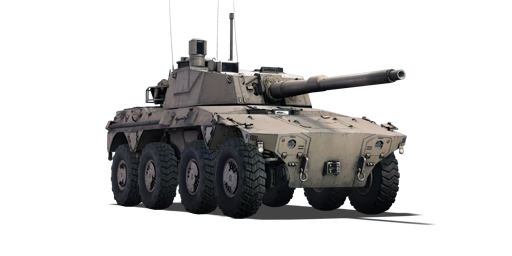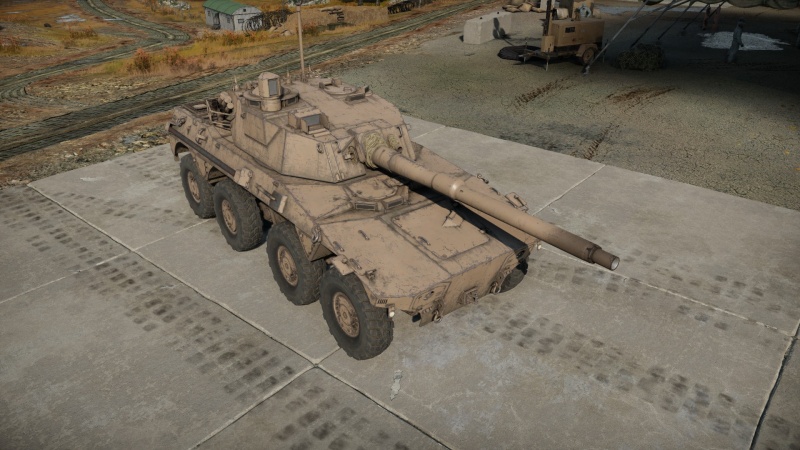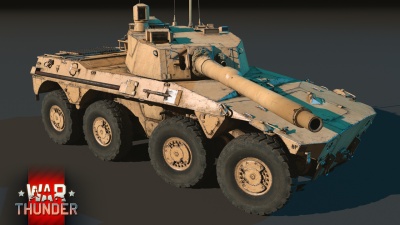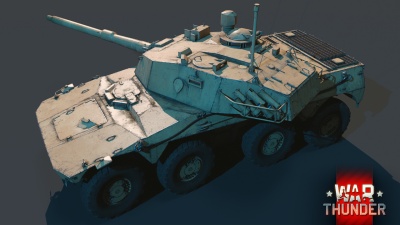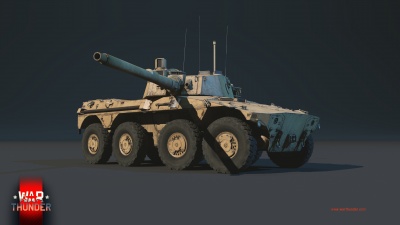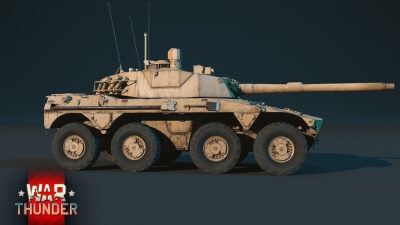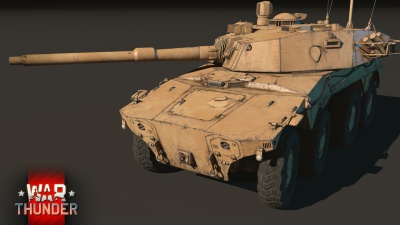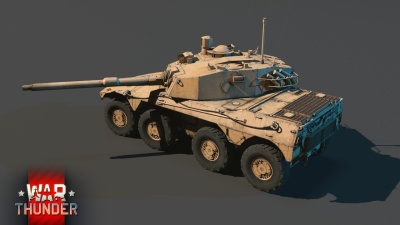Difference between revisions of "Rooikat 105"
Colok76286 (talk | contribs) (→External links: Added link to Military Today article) |
|||
| (34 intermediate revisions by 12 users not shown) | |||
| Line 1: | Line 1: | ||
| + | {{About | ||
| + | | about = British light tank '''{{PAGENAME}}''' | ||
| + | | usage = other versions | ||
| + | | link = Rooikat (Family) | ||
| + | }} | ||
{{Specs-Card | {{Specs-Card | ||
|code=uk_rooikat_105_td | |code=uk_rooikat_105_td | ||
| + | |images={{Specs-Card-Image|GarageImage_{{PAGENAME}}.jpg}} | ||
|store=8262 | |store=8262 | ||
}} | }} | ||
| Line 6: | Line 12: | ||
== Description == | == Description == | ||
<!-- ''In the description, the first part should be about the history of the creation and combat usage of the vehicle, as well as its key features. In the second part, tell the reader about the ground vehicle in the game. Insert a screenshot of the vehicle, so that if the novice player does not remember the vehicle by name, he will immediately understand what kind of vehicle the article is talking about.'' --> | <!-- ''In the description, the first part should be about the history of the creation and combat usage of the vehicle, as well as its key features. In the second part, tell the reader about the ground vehicle in the game. Insert a screenshot of the vehicle, so that if the novice player does not remember the vehicle by name, he will immediately understand what kind of vehicle the article is talking about.'' --> | ||
| − | [[ | + | In 1990, a programme was initiated by Reumech OMC to upgrade the [[Rooikat Mk.1D|Rooikat]] for the international market, with the intent of increasing its potency against other armoured vehicles. It was upgunned with the GT-7 105 mm cannon, a domestic variant of the ubiquitous Royal Ordnance L7 built by Denel, and made able to accept a range of NATO ammunition to improve compatibility with any potential customers. It was also equipped with updated features such as a new thermal imaging system. The Rooikat 105 was completed in 1994 and demonstrated to the SANDF, who decided that they were satisfied with the base model. The subsequent offering on the export market was also met with a lack of interest. Only a single prototype of the vehicle was ever constructed. |
| − | + | ||
| − | The | + | Introduced in [[Update 1.97 "Viking Fury"]], the '''Rooikat 105''' builds upon its predecessor [[Rooikat Mk.1D]] with more powerful armament and ammunition, while retaining the latter's excellent mobility. Able to be equipped with the powerful DM33 APFSDS round, the Rooikat 105 has more than sufficient firepower for any opponent it may face — combined with its outstanding mobility both on and off road, and excellent gun handling characteristics, it can excel in any role, be it long-range sniping, flanking, or even close range brawling. Players will also greatly appreciate the new thermal sight for the gunner, making identifying enemy targets a cinch. |
== General info == | == General info == | ||
=== Survivability and armour === | === Survivability and armour === | ||
| + | {{Specs-Tank-Armour}} | ||
<!-- ''Describe armour protection. Note the most well protected and key weak areas. Appreciate the layout of modules as well as the number and location of crew members. Is the level of armour protection sufficient, is the placement of modules helpful for survival in combat? If necessary use a visual template to indicate the most secure and weak zones of the armour.'' --> | <!-- ''Describe armour protection. Note the most well protected and key weak areas. Appreciate the layout of modules as well as the number and location of crew members. Is the level of armour protection sufficient, is the placement of modules helpful for survival in combat? If necessary use a visual template to indicate the most secure and weak zones of the armour.'' --> | ||
| − | + | ||
| + | The armour thickness ranges from 15 mm on the sides of the lower front plate to 30 mm near the gun breech of rolled homogeneous armour. This will protect the crew from small arms fire only, most 20 mm guns and above can penetrate the armour with relative ease. Most HE and HESH shells will overpressure the vehicle. | ||
| + | |||
| + | Wheels and suspension arms are made from 10 mm of structural steel. | ||
| + | |||
| + | The internal modules are relatively far apart and create a rather big empty space in the center of the vehicle. This gives it a small chance to survive APDS shells from the side when the turret is turned 90 degrees to either side, when the turret is pointed forward or backward, it fills this space with the ready ammo rack. Ammunition is also stored in the upper sides of the hull, as well as the rear of the turret. | ||
| + | |||
| + | The driver sits alone in the front of the vehicle while the commander, gunner and loader are placed rather high in the vehicle. This gives the turret crew a decent chance to survive side hits to the hull. A hit on the lower plate's left side (viewed from the front) will most likely kill the gunner, commander and driver and therefore destroy the vehicle. | ||
| + | |||
| + | Artillery strikes are lethal to the Rooikat. | ||
| + | |||
| + | '''Armour type:''' | ||
| + | |||
| + | * Rolled homogeneous armour (hull, turret, cupola) | ||
| + | * Wheel (tires, torsion bars) | ||
| + | |||
{| class="wikitable" | {| class="wikitable" | ||
|- | |- | ||
! Armour !! Front (Slope angle) !! Sides !! Rear !! Roof | ! Armour !! Front (Slope angle) !! Sides !! Rear !! Roof | ||
|- | |- | ||
| − | | Hull || | + | | Hull || 25 mm (77°) ''Upper glacis - Centre'' <br> 10 mm (75°) ''Upper glacis - Sides'' <br> 30 mm (23°) ''Lower glacis - Centre'' <br> 15 mm (23°) ''Lower glacis - Sides'' || 20 mm (25°) ''Top'' <br> 25 mm (0-9°) ''Bottom'' || 20 mm ''Upper plate'' <br> 20 mm (29°) ''Lower plate'' || 25 mm (13°) ''Front glacis - Centre'' <br> 10 mm (15°) ''Front glacis - Sides'' <br> 20 mm (0-13°) ''Driver compartment'' <br> 10 mm (0-17°) ''Crew compartment'' <br> 5 mm ''Radiator vents'' |
|- | |- | ||
| − | | Turret || | + | | Turret || 25 mm (26-28°) ''Turret front'' <br> 25 mm ''Gun mantlet - external'' <br> 30 mm (cylindrical) ''Gun mantlet - internal'' || 25 mm (12-16°) || 15 mm (15°) || 15 mm (9-12°) |
|- | |- | ||
| − | | Cupola || | + | | Cupola || colspan="3" style="text-align:center" | 25 mm (cylindrical) ''Base'' <br> 25 mm (spherical) ''Dome'' || 25 mm (spherical) ''Dome'' |
|- | |- | ||
| − | |} | + | |} |
| − | + | '''Notes:''' | |
| − | |||
| − | |||
| − | |||
| − | |||
| − | |||
| − | |||
| − | + | * Tires and torsion bars are 10 mm thick. | |
| + | * Belly armour is 15 mm thick. | ||
| + | * The internal part of the gun mantlet overlaps with parts of the turret front. | ||
=== Mobility === | === Mobility === | ||
| + | {{Specs-Tank-Mobility}} | ||
<!-- ''Write about the mobility of the ground vehicle. Estimate the specific power and manoeuvrability, as well as the maximum speed forwards and backwards.'' --> | <!-- ''Write about the mobility of the ground vehicle. Estimate the specific power and manoeuvrability, as well as the maximum speed forwards and backwards.'' --> | ||
| − | + | Mobility is extremely good. The engine will propel the vehicle to 130 km/h (AB) / 120 km/h (RB/SB) maximum on roads, though the average speed is around 40 to 65 km/h in light terrain, but acceleration is relatively poor. The wheeled chassis will allow to turn the vehicle without losing too much speed, though turning on the spot is not possible. Its two frontal axles pivot give it a gigantic turn radius, meaning that manoeuvring inside cities can range from difficult to nearly impossible. When crossing deep snow or sand the driver sometimes can't decide which gear to use and the vehicle will be stuck at the speed of that specific gear change even if it potentially has the power to go faster. Performance on any sort of incline is pretty poor with low power making some normally accessible slopes impossible to climb, care should be taken so as to not get stuck at the bottom of a trough. It is potentially very fast on paved roads and hard terrain but loses out on soft terrain and speed-wise to some vehicles, like the Centauro and the Type 16. | |
| − | + | {{tankMobility|abMinHp=879|rbMinHp=501}} | |
| + | |||
| + | === Modifications and economy === | ||
| + | {{Specs-Economy}} | ||
== Armaments == | == Armaments == | ||
| + | {{Specs-Tank-Armaments}} | ||
=== Main armament === | === Main armament === | ||
| + | {{Specs-Tank-Weapon|1}} | ||
<!-- ''Give the reader information about the characteristics of the main gun. Assess its effectiveness in a battle based on the reloading speed, ballistics and the power of shells. Do not forget about the flexibility of the fire, that is how quickly the cannon can be aimed at the target, open fire on it and aim at another enemy. Add a link to the main article on the gun: <code><nowiki>{{main|Name of the weapon}}</nowiki></code>. Describe in general terms the ammunition available for the main gun. Give advice on how to use them and how to fill the ammunition storage.'' --> | <!-- ''Give the reader information about the characteristics of the main gun. Assess its effectiveness in a battle based on the reloading speed, ballistics and the power of shells. Do not forget about the flexibility of the fire, that is how quickly the cannon can be aimed at the target, open fire on it and aim at another enemy. Add a link to the main article on the gun: <code><nowiki>{{main|Name of the weapon}}</nowiki></code>. Describe in general terms the ammunition available for the main gun. Give advice on how to use them and how to fill the ammunition storage.'' --> | ||
{{main|GT-7 (105 mm)}} | {{main|GT-7 (105 mm)}} | ||
| − | The vehicle is armed with the South African GT-7 105 mm rifled cannon, which is almost identical to the L7A3 used on the German Leopard and Leopard A1A1. It gets the same ammunition choices of DM12 HEATFS, | + | The vehicle is armed with the South African GT-7 105 mm rifled cannon, which is almost identical to the L7A3 used on the German Leopard and Leopard A1A1. It gets the same ammunition choices of DM12 HEATFS, DM512 HESH, and DM23 APFSDS, in addition to the improved DM33 APFSDS shell, as well as the same reload speed. The gun elevation speed is atrocious: the user has to be aware of the gun's current angle when fighting in close quarters. This can cause you to lose duels or make you overshoot in hectic close quarters engagements. |
{| class="wikitable" style="text-align:center" width="100%" | {| class="wikitable" style="text-align:center" width="100%" | ||
| Line 58: | Line 82: | ||
|- | |- | ||
! ''Arcade'' | ! ''Arcade'' | ||
| − | | rowspan="2" | 32 || rowspan="2" | -10°/+20° || rowspan="2" | ±180° || rowspan="2" | Two-plane || | + | | rowspan="2" | 32 || rowspan="2" | -10°/+20° || rowspan="2" | ±180° || rowspan="2" | Two-plane || 38.1 || 52.7 || 64.0 || 70.8 || 75.3 || rowspan="2" | 8.71 || rowspan="2" | 7.70 || rowspan="2" | 7.10 || rowspan="2" | 6.70 |
|- | |- | ||
! ''Realistic'' | ! ''Realistic'' | ||
| − | |23.8||28.0|| | + | | 23.8 || 28.0 || 34.0 || 37.6 || 40.0 |
|- | |- | ||
|} | |} | ||
==== Ammunition ==== | ==== Ammunition ==== | ||
| − | The HEATFS and APFSDS can easily deal with most enemies presented at its battle-rating | + | The HEATFS and APFSDS can easily deal with most enemies presented at its battle-rating. The HESH is very situational, but might be good for light-skinned vehicles or helicopters. It is usually best to mostly take APFSDS shells, since it can easily handle every vehicle type, but unlike HEATFS doesn't detonate on bushes or fences and isn't stopped by ERA. |
| − | { | + | {{:GT-7 (105 mm)/Ammunition|DM12, DM512, DM23, DM33}} |
| − | |||
| − | |||
| − | |||
| − | |||
| − | |||
| − | |||
| − | |||
| − | |||
| − | |||
| − | |||
| − | |||
| − | |||
| − | |||
| − | |||
| − | |||
| − | |||
| − | |||
| − | |||
| − | |||
| − | |||
| − | |||
| − | |||
| − | |||
| − | |||
| − | |||
| − | |||
| − | |||
| − | |||
| − | |||
| − | | DM12 | ||
| − | |||
| − | |||
| − | |||
| − | |||
| − | |||
| − | |||
==== [[Ammo racks]] ==== | ==== [[Ammo racks]] ==== | ||
[[File:Ammoracks_{{PAGENAME}}.png|right|thumb|x250px|[[Ammo racks]] of the {{PAGENAME}}]] | [[File:Ammoracks_{{PAGENAME}}.png|right|thumb|x250px|[[Ammo racks]] of the {{PAGENAME}}]] | ||
| + | <!-- '''Last updated:''' --> | ||
{| class="wikitable" style="text-align:center" | {| class="wikitable" style="text-align:center" | ||
|- | |- | ||
| Line 125: | Line 114: | ||
=== Machine guns === | === Machine guns === | ||
| + | {{Specs-Tank-Weapon|2}} | ||
<!-- ''Offensive and anti-aircraft machine guns not only allow you to fight some aircraft but also are effective against lightly armoured vehicles. Evaluate machine guns and give recommendations on its use.'' --> | <!-- ''Offensive and anti-aircraft machine guns not only allow you to fight some aircraft but also are effective against lightly armoured vehicles. Evaluate machine guns and give recommendations on its use.'' --> | ||
{{main|Browning MG4 (7.62 mm)}} | {{main|Browning MG4 (7.62 mm)}} | ||
| Line 134: | Line 124: | ||
! Mount !! Capacity (Belt) !! Fire rate !! Vertical !! Horizontal | ! Mount !! Capacity (Belt) !! Fire rate !! Vertical !! Horizontal | ||
|- | |- | ||
| − | | Coaxial || | + | | Coaxial || 3,000 (250) || 500 || N/A || N/A |
|- | |- | ||
|} | |} | ||
== Usage in battles == | == Usage in battles == | ||
| − | <!--''Describe the tactics of playing in the vehicle, the features of using vehicles in the team and advice on tactics. Refrain from creating a "guide" - do not impose a single point of view but instead give the reader food for thought. Describe the most dangerous enemies and give recommendations on fighting them. If necessary, note the specifics of the game in different modes (AB, RB, SB).''--> | + | <!-- ''Describe the tactics of playing in the vehicle, the features of using vehicles in the team and advice on tactics. Refrain from creating a "guide" - do not impose a single point of view but instead give the reader food for thought. Describe the most dangerous enemies and give recommendations on fighting them. If necessary, note the specifics of the game in different modes (AB, RB, SB).'' --> |
| + | |||
| + | The Rooikat 105 is as fast as a cheetah, travelling at 120 km/h in RB and 130 km/h in AB. It is as nimble and powerful as an African rock python. Both of these almighty animals have one major weakness - they both lack protection, which is the same for the Rooikat 105. | ||
| − | + | A main advantage of the Rooikat 105 is its ability to capitalise on its speed,.It is able to find a concealed spot and wait for its prey to cross into its sights. The Rooikat 105 features an up-gunned cannon, from 76 mm to 105 mm, an increase of 38%. Which means it's a 38% larger round hitting the target. Its GT-7 105 mm rifled cannon is highly accurate, able to deliver its round on target over 3,000 m away. Additionally, the Rooikat 105 features thermal sights, which makes finding enemy tanks that are using foliage a breeze. | |
| − | + | However, it lacks any armour, the thickest part of this fine tank is around the barrel at 40 mm. The front only offers up to, 30 mm. The side offers only up to 25 mm of thickness. This means that a .50 cal rifle will be able to penetrate the tank. | |
| − | + | '''''Engaging enemy tanks''''' | |
| − | + | Unlike other tanks in the British tree which allow for a broadside to be taken, the Rooikat cannot, as it lacks any type of protection, the only protection it allows for is over-penetration of high fuse rounds. The technical advantages of this tank must be played to the fullest extent by leveraging the advantages of the terrain on the map. This means that hills, houses, bridges, forests and ridges are used along with the appropriate camouflage selection for the map, to reduce the chances of being seen by the enemy. | |
| − | + | When engaging enemy tanks, aim for the sides and front, ideally aim for the location of crew members and critical elements - anywhere which is flat. | |
| − | + | * The DM33 APFSDS shell offers up to 400 mm of penetration. | |
| − | + | The Rooikat will allow for them to be seen, whether it be day or night, using the thermal gun sight. Make sure to use the laser rangefinder to adjust and correct the shot so it hits the enemy tank the first time. If the shot misses, move the tank to another location the reload takes up to 6.7 seconds. Most rival tanks provide an autoloader which substantially reduces their reload times, they may be able to fire two or three rounds in this time towards your location. Only one round needs to hit to knock you out. | |
| − | + | Commander sights placed up top means you can peek from behind ridgelines and hills, easily scouting enemy units from safe cover. Using commander override will facilitate quick snapshots as well. | |
| − | '''''Night Battles''''' | + | '''''Night Battles''''' |
| − | Rooikat 105, is the African rock python, just like the snake itself at night this lightly armoured vehicle becomes the master of the battle. | + | Rooikat 105, is the African rock python, just like the snake itself at night this lightly armoured vehicle becomes the master of the battle. Its fast speed, high agility and accurate cannon allows for it to be unseen, in the dead of night. It's vital to use your thermal sights as well as using the vegetation to make sure enemy tanks such as the [[Object 120]] do not detect you. They can easily knock you out with one shot from their pin-point accurate dart like rounds, which can destroy the toughest of tanks easily. |
| − | It's extremely important, | + | It's extremely important that, when you have fired a shot, you move to a new location, using the darkness of battle as your cover. Do not stay in the same spot, because the enemy tanks will have seen your muzzle flash and now would be scanning the battlefield in that area with their thermal sights or radar. Instead, fire a single shot, move and repeat and keep the enemy unaware of your presence. |
| − | '''''Capturing & Defending Zones''''' | + | '''''Capturing & Defending Zones''''' |
| − | |||
| − | |||
| − | + | Use the gunner's thermal sight to check the area of the cap zone making sure no light sources can be seen. If it is clear and no enemy tanks are hiding in the distance waiting for you to cross into their sights, head towards the cap. When approaching the cap zone head towards an object in the cap zone and stay behind it while you cap the zone. | |
| − | + | Defending the cap zone is a easy process, withdraw from the zone and use the terrain to your advantage. The enemy will try to counterattack, wait for them to counterattack, then only once they are close use the APFSDS rounds to knock them out. | |
| − | |||
| − | |||
| − | |||
| − | |||
| − | |||
| − | |||
| − | |||
| − | |||
| − | |||
| − | |||
| − | |||
| − | |||
| − | |||
| − | |||
| − | |||
| − | |||
| − | |||
| − | |||
| − | |||
| − | |||
| − | |||
| − | |||
| − | |||
| − | |||
| − | |||
| − | |||
| − | |||
| − | |||
| − | |||
| − | |||
| − | |||
| − | |||
| − | |||
| − | |||
| − | |||
| − | |||
| − | |||
| − | |||
| − | |||
| − | |||
| − | |||
=== Pros and cons === | === Pros and cons === | ||
| Line 218: | Line 167: | ||
* Excellent mobility | * Excellent mobility | ||
| − | * Decent gun | + | * Has early access to the DM33 APFSDS, which arguably makes it even more dangerous than medium tanks, especially considering its top speed |
| − | * | + | * Decent gun handling, even on the move due to the two-plane gun stabilizer |
| + | * Has access to thermal optics, unlike the [[Rooikat_Mk.1D]], allowing it to see through its own ESS, among other benefits | ||
'''Cons:''' | '''Cons:''' | ||
| − | * Poor survivability | + | * Poor survivability against autocannons, reloads slower than many light tanks |
| − | * Susceptible to the | + | * Susceptible to the overpressure mechanic, it is possible to deny its rush attack by simply being prepared |
| + | * Poor turn rate | ||
== History == | == History == | ||
<!-- ''Describe the history of the creation and combat usage of the vehicle in more detail than in the introduction. If the historical reference turns out to be too long, take it to a separate article, taking a link to the article about the vehicle and adding a block "/History" (example: <nowiki>https://wiki.warthunder.com/(Vehicle-name)/History</nowiki>) and add a link to it here using the <code>main</code> template. Be sure to reference text and sources by using <code><nowiki><ref></ref></nowiki></code>, as well as adding them at the end of the article with <code><nowiki><references /></nowiki></code>. This section may also include the vehicle's dev blog entry (if applicable) and the in-game encyclopedia description (under <code><nowiki>=== In-game description ===</nowiki></code>, also if applicable).'' --> | <!-- ''Describe the history of the creation and combat usage of the vehicle in more detail than in the introduction. If the historical reference turns out to be too long, take it to a separate article, taking a link to the article about the vehicle and adding a block "/History" (example: <nowiki>https://wiki.warthunder.com/(Vehicle-name)/History</nowiki>) and add a link to it here using the <code>main</code> template. Be sure to reference text and sources by using <code><nowiki><ref></ref></nowiki></code>, as well as adding them at the end of the article with <code><nowiki><references /></nowiki></code>. This section may also include the vehicle's dev blog entry (if applicable) and the in-game encyclopedia description (under <code><nowiki>=== In-game description ===</nowiki></code>, also if applicable).'' --> | ||
An upgrade and redesign program for the Rooikat was launched by Reumech OMC in 1990 for use internationally. This led to the development of the Rooikat 105 prototype with the GT-7 105 mm rifled cannon. The Rooikat 105 was made for high mobility operations taking place in both day and night. It was equipped with night vision and thermal imagery equipment for operations taking place in the dark of night. The gun used in the Rooikat 105 is the GT-7 105 mm rifled anti-tank gun. It fires a range of {{Annotation|NATO|North Atlantic Treaty Organization}} tank shells including HEATFS, HESH and APFSDS. This gun can fire up to 6 rounds a minute (about 10 second reload). On the real version, there are two 7.62 mm machine guns for anti-infantry and anti-air, one in the turret and one in the commander's position. In-game there is only one in the turret. There are 4 smoke grenades on each side of the turret in a smoke screen configuration and the ability to use an exhaust generator. Automatic data input includes the laser rangefinder that can calculate the range of a target as well as the speed, direction of travel, wind speed, wind direction and weapon tilt. Manual data input only includes the ammunition type and the environment of its surroundings. The weapon system allows the Rooikat 105 to attack targets while on the move on rough terrain. The most complex systems of the Rooikat 105 are the gun stabiliser, the gunner's stabilised sight, the gunner's sight with night vision and the commander's individual panoramic sight. | An upgrade and redesign program for the Rooikat was launched by Reumech OMC in 1990 for use internationally. This led to the development of the Rooikat 105 prototype with the GT-7 105 mm rifled cannon. The Rooikat 105 was made for high mobility operations taking place in both day and night. It was equipped with night vision and thermal imagery equipment for operations taking place in the dark of night. The gun used in the Rooikat 105 is the GT-7 105 mm rifled anti-tank gun. It fires a range of {{Annotation|NATO|North Atlantic Treaty Organization}} tank shells including HEATFS, HESH and APFSDS. This gun can fire up to 6 rounds a minute (about 10 second reload). On the real version, there are two 7.62 mm machine guns for anti-infantry and anti-air, one in the turret and one in the commander's position. In-game there is only one in the turret. There are 4 smoke grenades on each side of the turret in a smoke screen configuration and the ability to use an exhaust generator. Automatic data input includes the laser rangefinder that can calculate the range of a target as well as the speed, direction of travel, wind speed, wind direction and weapon tilt. Manual data input only includes the ammunition type and the environment of its surroundings. The weapon system allows the Rooikat 105 to attack targets while on the move on rough terrain. The most complex systems of the Rooikat 105 are the gun stabiliser, the gunner's stabilised sight, the gunner's sight with night vision and the commander's individual panoramic sight. | ||
| + | |||
| + | === [[wt:en/news/6602-development-rooikat-105-the-cat-with-bigger-claws-en|Devblog]] === | ||
| + | After the Rooikat 76 entered production in the early 1990s, South African engineers continued developing the vehicle in an effort to further expand upon its capabilities. As such, the engineers decided to, among other minor changes and improvements, fit the Rooikat with a larger 105 mm cannon, thus creating the Rooikat 105 in the process. | ||
| + | |||
| + | Development of the Rooikat 105 was completed in 1994 and a single prototype was built. However, after demonstrating the vehicle to the SANDF, the military decided not to procure the improved version of the Rooikat, given that they were already more than content with the base model of the vehicle. | ||
| + | |||
| + | As a result, the Rooikat 105 was subsequently offered on the export market in an effort to secure orders for the vehicles. However, despite its 105 mm cannon and compatibility with most NATO rounds, the Rooikat 105 failed to attract the interest of any potential foreign customers. In the end, only a single prototype of the Rooikat 105 was constructed, with the vehicle never entering production due to lacking demand. | ||
== Media == | == Media == | ||
| Line 235: | Line 193: | ||
;Skins | ;Skins | ||
| − | * [ | + | * [https://live.warthunder.com/feed/camouflages/?vehicle=uk_rooikat_105_td Skins and camouflages for the {{PAGENAME}} from live.warthunder.com.] |
| + | |||
| + | ;Images | ||
| + | <gallery mode="packed" heights="150"> | ||
| + | File:Rooikat 105 WTWallpaper 01.jpg| | ||
| + | File:Rooikat 105 WTWallpaper 02.jpg| | ||
| + | File:Rooikat 105 WTWallpaper 03.jpg| | ||
| + | File:Rooikat 105 WTWallpaper 04.jpg| | ||
| + | File:Rooikat 105 WTWallpaper 05.jpg| | ||
| + | File:Rooikat 105 WTWallpaper 06.jpg| | ||
| + | </gallery> | ||
;Videos | ;Videos | ||
| Line 244: | Line 212: | ||
* ''reference to the series of the vehicles;'' | * ''reference to the series of the vehicles;'' | ||
* ''links to approximate analogues of other nations and research trees.'' --> | * ''links to approximate analogues of other nations and research trees.'' --> | ||
| − | |||
| − | |||
| − | |||
| − | |||
;Other vehicles of similar configuration and role | ;Other vehicles of similar configuration and role | ||
| Line 258: | Line 222: | ||
<!-- ''Paste links to sources and external resources, such as:'' | <!-- ''Paste links to sources and external resources, such as:'' | ||
* ''topic on the official game forum;'' | * ''topic on the official game forum;'' | ||
| − | |||
* ''other literature.'' --> | * ''other literature.'' --> | ||
| Line 264: | Line 227: | ||
* [http://www.military-today.com/artillery/rooikat_105.htm <nowiki>[Military Today]</nowiki> Rooikat 105 Tank Destroyer] | * [http://www.military-today.com/artillery/rooikat_105.htm <nowiki>[Military Today]</nowiki> Rooikat 105 Tank Destroyer] | ||
| − | {{Britain | + | {{Britain light tanks}} |
{{Britain premium ground vehicles}} | {{Britain premium ground vehicles}} | ||
| + | [[Category:Wheeled ground vehicles]] | ||
Revision as of 19:58, 26 November 2023
| This page is about the British light tank Rooikat 105. For other versions, see Rooikat (Family). |
Contents
Description
In 1990, a programme was initiated by Reumech OMC to upgrade the Rooikat for the international market, with the intent of increasing its potency against other armoured vehicles. It was upgunned with the GT-7 105 mm cannon, a domestic variant of the ubiquitous Royal Ordnance L7 built by Denel, and made able to accept a range of NATO ammunition to improve compatibility with any potential customers. It was also equipped with updated features such as a new thermal imaging system. The Rooikat 105 was completed in 1994 and demonstrated to the SANDF, who decided that they were satisfied with the base model. The subsequent offering on the export market was also met with a lack of interest. Only a single prototype of the vehicle was ever constructed.
Introduced in Update 1.97 "Viking Fury", the Rooikat 105 builds upon its predecessor Rooikat Mk.1D with more powerful armament and ammunition, while retaining the latter's excellent mobility. Able to be equipped with the powerful DM33 APFSDS round, the Rooikat 105 has more than sufficient firepower for any opponent it may face — combined with its outstanding mobility both on and off road, and excellent gun handling characteristics, it can excel in any role, be it long-range sniping, flanking, or even close range brawling. Players will also greatly appreciate the new thermal sight for the gunner, making identifying enemy targets a cinch.
General info
Survivability and armour
The armour thickness ranges from 15 mm on the sides of the lower front plate to 30 mm near the gun breech of rolled homogeneous armour. This will protect the crew from small arms fire only, most 20 mm guns and above can penetrate the armour with relative ease. Most HE and HESH shells will overpressure the vehicle.
Wheels and suspension arms are made from 10 mm of structural steel.
The internal modules are relatively far apart and create a rather big empty space in the center of the vehicle. This gives it a small chance to survive APDS shells from the side when the turret is turned 90 degrees to either side, when the turret is pointed forward or backward, it fills this space with the ready ammo rack. Ammunition is also stored in the upper sides of the hull, as well as the rear of the turret.
The driver sits alone in the front of the vehicle while the commander, gunner and loader are placed rather high in the vehicle. This gives the turret crew a decent chance to survive side hits to the hull. A hit on the lower plate's left side (viewed from the front) will most likely kill the gunner, commander and driver and therefore destroy the vehicle.
Artillery strikes are lethal to the Rooikat.
Armour type:
- Rolled homogeneous armour (hull, turret, cupola)
- Wheel (tires, torsion bars)
| Armour | Front (Slope angle) | Sides | Rear | Roof |
|---|---|---|---|---|
| Hull | 25 mm (77°) Upper glacis - Centre 10 mm (75°) Upper glacis - Sides 30 mm (23°) Lower glacis - Centre 15 mm (23°) Lower glacis - Sides |
20 mm (25°) Top 25 mm (0-9°) Bottom |
20 mm Upper plate 20 mm (29°) Lower plate |
25 mm (13°) Front glacis - Centre 10 mm (15°) Front glacis - Sides 20 mm (0-13°) Driver compartment 10 mm (0-17°) Crew compartment 5 mm Radiator vents |
| Turret | 25 mm (26-28°) Turret front 25 mm Gun mantlet - external 30 mm (cylindrical) Gun mantlet - internal |
25 mm (12-16°) | 15 mm (15°) | 15 mm (9-12°) |
| Cupola | 25 mm (cylindrical) Base 25 mm (spherical) Dome |
25 mm (spherical) Dome | ||
Notes:
- Tires and torsion bars are 10 mm thick.
- Belly armour is 15 mm thick.
- The internal part of the gun mantlet overlaps with parts of the turret front.
Mobility
Mobility is extremely good. The engine will propel the vehicle to 130 km/h (AB) / 120 km/h (RB/SB) maximum on roads, though the average speed is around 40 to 65 km/h in light terrain, but acceleration is relatively poor. The wheeled chassis will allow to turn the vehicle without losing too much speed, though turning on the spot is not possible. Its two frontal axles pivot give it a gigantic turn radius, meaning that manoeuvring inside cities can range from difficult to nearly impossible. When crossing deep snow or sand the driver sometimes can't decide which gear to use and the vehicle will be stuck at the speed of that specific gear change even if it potentially has the power to go faster. Performance on any sort of incline is pretty poor with low power making some normally accessible slopes impossible to climb, care should be taken so as to not get stuck at the bottom of a trough. It is potentially very fast on paved roads and hard terrain but loses out on soft terrain and speed-wise to some vehicles, like the Centauro and the Type 16.
| Game Mode | Max Speed (km/h) | Weight (tons) | Engine power (horsepower) | Power-to-weight ratio (hp/ton) | |||
|---|---|---|---|---|---|---|---|
| Forward | Reverse | Stock | Upgraded | Stock | Upgraded | ||
| Arcade | 134 | 41 | 28.5 | 879 | 1,082 | 30.84 | 37.96 |
| Realistic | 121 | 37 | 501 | 567 | 17.58 | 19.89 | |
Modifications and economy
Armaments
Main armament
The vehicle is armed with the South African GT-7 105 mm rifled cannon, which is almost identical to the L7A3 used on the German Leopard and Leopard A1A1. It gets the same ammunition choices of DM12 HEATFS, DM512 HESH, and DM23 APFSDS, in addition to the improved DM33 APFSDS shell, as well as the same reload speed. The gun elevation speed is atrocious: the user has to be aware of the gun's current angle when fighting in close quarters. This can cause you to lose duels or make you overshoot in hectic close quarters engagements.
| 105 mm GT-7 | Turret rotation speed (°/s) | Reloading rate (seconds) | |||||||||||
|---|---|---|---|---|---|---|---|---|---|---|---|---|---|
| Mode | Capacity | Vertical | Horizontal | Stabilizer | Stock | Upgraded | Full | Expert | Aced | Stock | Full | Expert | Aced |
| Arcade | 32 | -10°/+20° | ±180° | Two-plane | 38.1 | 52.7 | 64.0 | 70.8 | 75.3 | 8.71 | 7.70 | 7.10 | 6.70 |
| Realistic | 23.8 | 28.0 | 34.0 | 37.6 | 40.0 | ||||||||
Ammunition
The HEATFS and APFSDS can easily deal with most enemies presented at its battle-rating. The HESH is very situational, but might be good for light-skinned vehicles or helicopters. It is usually best to mostly take APFSDS shells, since it can easily handle every vehicle type, but unlike HEATFS doesn't detonate on bushes or fences and isn't stopped by ERA.
| Penetration statistics | |||||||
|---|---|---|---|---|---|---|---|
| Ammunition | Type of warhead |
Penetration @ 0° Angle of Attack (mm) | |||||
| 10 m | 100 m | 500 m | 1,000 m | 1,500 m | 2,000 m | ||
| DM12 | HEATFS | 400 | 400 | 400 | 400 | 400 | 400 |
| DM512 | HESH | 127 | 127 | 127 | 127 | 127 | 127 |
| DM23 | APFSDS | 337 | 335 | 330 | 322 | 314 | 306 |
| DM33 | APFSDS | 408 | 405 | 398 | 389 | 379 | 370 |
| Shell details | ||||||||||||
|---|---|---|---|---|---|---|---|---|---|---|---|---|
| Ammunition | Type of warhead |
Velocity (m/s) |
Projectile mass (kg) |
Fuse delay (m) |
Fuse sensitivity (mm) |
Explosive mass (TNT equivalent) (kg) |
Ricochet | |||||
| 0% | 50% | 100% | ||||||||||
| DM12 | HEATFS | 1,174 | 10.5 | 0.05 | 0.1 | 1.27 | 65° | 72° | 77° | |||
| DM512 | HESH | 732 | 11.2 | 0.1 | 4 | 4.31 | 73° | 77° | 80° | |||
| DM23 | APFSDS | 1,455 | 4.2 | - | - | - | 78° | 80° | 81° | |||
| DM33 | APFSDS | 1,455 | 3.79 | - | - | - | 78° | 80° | 81° | |||
Ammo racks
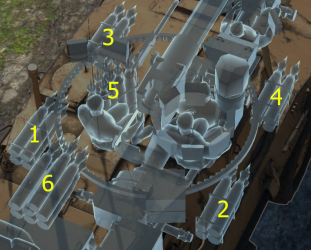
| Full ammo |
1st rack empty |
2nd rack empty |
3rd rack empty |
4th rack empty |
5th rack empty* |
6th rack empty* |
Visual discrepancy |
|---|---|---|---|---|---|---|---|
| 32 | 29 (+3) | 25 (+7) | 21 (+11) | 17 (+15) | 8 (+24) | 1 (+31) | No |
To be noted that both 5th and 6th racks are First-stage ammo stowages.
Machine guns
| 7.62 mm Browning MG4 | ||||
|---|---|---|---|---|
| Mount | Capacity (Belt) | Fire rate | Vertical | Horizontal |
| Coaxial | 3,000 (250) | 500 | N/A | N/A |
Usage in battles
The Rooikat 105 is as fast as a cheetah, travelling at 120 km/h in RB and 130 km/h in AB. It is as nimble and powerful as an African rock python. Both of these almighty animals have one major weakness - they both lack protection, which is the same for the Rooikat 105.
A main advantage of the Rooikat 105 is its ability to capitalise on its speed,.It is able to find a concealed spot and wait for its prey to cross into its sights. The Rooikat 105 features an up-gunned cannon, from 76 mm to 105 mm, an increase of 38%. Which means it's a 38% larger round hitting the target. Its GT-7 105 mm rifled cannon is highly accurate, able to deliver its round on target over 3,000 m away. Additionally, the Rooikat 105 features thermal sights, which makes finding enemy tanks that are using foliage a breeze.
However, it lacks any armour, the thickest part of this fine tank is around the barrel at 40 mm. The front only offers up to, 30 mm. The side offers only up to 25 mm of thickness. This means that a .50 cal rifle will be able to penetrate the tank.
Engaging enemy tanks
Unlike other tanks in the British tree which allow for a broadside to be taken, the Rooikat cannot, as it lacks any type of protection, the only protection it allows for is over-penetration of high fuse rounds. The technical advantages of this tank must be played to the fullest extent by leveraging the advantages of the terrain on the map. This means that hills, houses, bridges, forests and ridges are used along with the appropriate camouflage selection for the map, to reduce the chances of being seen by the enemy.
When engaging enemy tanks, aim for the sides and front, ideally aim for the location of crew members and critical elements - anywhere which is flat.
- The DM33 APFSDS shell offers up to 400 mm of penetration.
The Rooikat will allow for them to be seen, whether it be day or night, using the thermal gun sight. Make sure to use the laser rangefinder to adjust and correct the shot so it hits the enemy tank the first time. If the shot misses, move the tank to another location the reload takes up to 6.7 seconds. Most rival tanks provide an autoloader which substantially reduces their reload times, they may be able to fire two or three rounds in this time towards your location. Only one round needs to hit to knock you out.
Commander sights placed up top means you can peek from behind ridgelines and hills, easily scouting enemy units from safe cover. Using commander override will facilitate quick snapshots as well.
Night Battles
Rooikat 105, is the African rock python, just like the snake itself at night this lightly armoured vehicle becomes the master of the battle. Its fast speed, high agility and accurate cannon allows for it to be unseen, in the dead of night. It's vital to use your thermal sights as well as using the vegetation to make sure enemy tanks such as the Object 120 do not detect you. They can easily knock you out with one shot from their pin-point accurate dart like rounds, which can destroy the toughest of tanks easily.
It's extremely important that, when you have fired a shot, you move to a new location, using the darkness of battle as your cover. Do not stay in the same spot, because the enemy tanks will have seen your muzzle flash and now would be scanning the battlefield in that area with their thermal sights or radar. Instead, fire a single shot, move and repeat and keep the enemy unaware of your presence.
Capturing & Defending Zones
Use the gunner's thermal sight to check the area of the cap zone making sure no light sources can be seen. If it is clear and no enemy tanks are hiding in the distance waiting for you to cross into their sights, head towards the cap. When approaching the cap zone head towards an object in the cap zone and stay behind it while you cap the zone.
Defending the cap zone is a easy process, withdraw from the zone and use the terrain to your advantage. The enemy will try to counterattack, wait for them to counterattack, then only once they are close use the APFSDS rounds to knock them out.
Pros and cons
Pros:
- Excellent mobility
- Has early access to the DM33 APFSDS, which arguably makes it even more dangerous than medium tanks, especially considering its top speed
- Decent gun handling, even on the move due to the two-plane gun stabilizer
- Has access to thermal optics, unlike the Rooikat_Mk.1D, allowing it to see through its own ESS, among other benefits
Cons:
- Poor survivability against autocannons, reloads slower than many light tanks
- Susceptible to the overpressure mechanic, it is possible to deny its rush attack by simply being prepared
- Poor turn rate
History
An upgrade and redesign program for the Rooikat was launched by Reumech OMC in 1990 for use internationally. This led to the development of the Rooikat 105 prototype with the GT-7 105 mm rifled cannon. The Rooikat 105 was made for high mobility operations taking place in both day and night. It was equipped with night vision and thermal imagery equipment for operations taking place in the dark of night. The gun used in the Rooikat 105 is the GT-7 105 mm rifled anti-tank gun. It fires a range of NATO tank shells including HEATFS, HESH and APFSDS. This gun can fire up to 6 rounds a minute (about 10 second reload). On the real version, there are two 7.62 mm machine guns for anti-infantry and anti-air, one in the turret and one in the commander's position. In-game there is only one in the turret. There are 4 smoke grenades on each side of the turret in a smoke screen configuration and the ability to use an exhaust generator. Automatic data input includes the laser rangefinder that can calculate the range of a target as well as the speed, direction of travel, wind speed, wind direction and weapon tilt. Manual data input only includes the ammunition type and the environment of its surroundings. The weapon system allows the Rooikat 105 to attack targets while on the move on rough terrain. The most complex systems of the Rooikat 105 are the gun stabiliser, the gunner's stabilised sight, the gunner's sight with night vision and the commander's individual panoramic sight.
Devblog
After the Rooikat 76 entered production in the early 1990s, South African engineers continued developing the vehicle in an effort to further expand upon its capabilities. As such, the engineers decided to, among other minor changes and improvements, fit the Rooikat with a larger 105 mm cannon, thus creating the Rooikat 105 in the process.
Development of the Rooikat 105 was completed in 1994 and a single prototype was built. However, after demonstrating the vehicle to the SANDF, the military decided not to procure the improved version of the Rooikat, given that they were already more than content with the base model of the vehicle.
As a result, the Rooikat 105 was subsequently offered on the export market in an effort to secure orders for the vehicles. However, despite its 105 mm cannon and compatibility with most NATO rounds, the Rooikat 105 failed to attract the interest of any potential foreign customers. In the end, only a single prototype of the Rooikat 105 was constructed, with the vehicle never entering production due to lacking demand.
Media
- Skins
- Images
- Videos
See also
- Other vehicles of similar configuration and role
External links
| Britain light tanks | |
|---|---|
| A13 | A13 Mk I · A13 Mk I (3rd R.T.R.) · A13 Mk II · A13 Mk II 1939 |
| A15 | Crusader II · Crusader "The Saint" · Crusader III |
| A17 | Tetrarch I |
| IFV | Warrior · Desert Warrior (Kuwait) |
| Wheeled | Daimler Mk II · AEC Mk II · Fox · Vickers Mk.11 |
| Other | VFM5 |
| South Africa | |
| SARC | SARC MkIVa · SARC MkVI (2pdr) · SARC MkVI (6pdr) |
| Ratel | Ratel 90 · Ratel 20 |
| Rooikat | Rooikat Mk.1D · Rooikat 105 · Rooikat MTTD |
| Other | Concept 3 · Eland 90 Mk.7 |
| USA | Stuart I · Stuart III |
| Britain premium ground vehicles | |
|---|---|
| Light tanks | A13 Mk I (3rd R.T.R.) · A13 Mk II 1939 · AEC Mk II · Crusader "The Saint" · Rooikat 105 |
| Medium tanks | A.C.I · Grant I · Cromwell V (RP-3) · Sherman IC "Trzyniec" · A.C.IV · Comet I "Iron Duke IV" |
| Centurion Mk.2 · ▄Strv 81 (RB 52) · Centurion Mk.5 AVRE · Centurion Mk.5/1 · ▄Sho't Kal Dalet · Centurion Action X | |
| Vijayanta · Khalid · Challenger DS · Challenger 2 OES | |
| Heavy tanks | Independent · Matilda Hedgehog · Excelsior · TOG II · Churchill Crocodile · Black Prince |
| Tank destroyers | Alecto I · Achilles (65 Rg.) · QF 3.7 Ram |
- Ground vehicles
- Britain ground vehicles
- Sixth rank ground vehicles
- Premium ground vehicles
- Light tanks
- Ground vehicles with smoke grenades
- Ground vehicles with engine smoke generating system
- Ground vehicles with night vision device
- Ground vehicles with thermal sight
- Ground vehicles with gun stabilizer
- Wheeled ground vehicles


